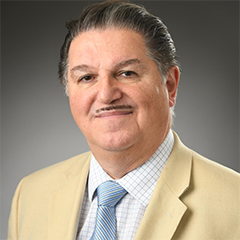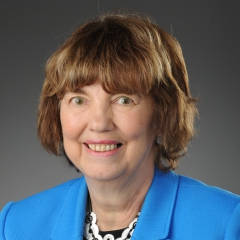The coalition has more than 50 representatives from non-governmental psychology organizations, including Fordham faculty and alumni—most notably, PCUN’s president, David Marcotte, S.J. The scholars work together to develop research-based recommendations for policymakers at the U.N.

“The primary goal of PCUN is to promote evidence-based policies,” said Harold Takooshian, Ph.D., PCUN’s treasurer and secretary and professor of psychology and urban studies and director of the organizational leadership program at Fordham. “We behavioral scientists feel that the best way to make policies is based on evidence. We conduct research on timely topics like migration and hunger, and research helps us find better solutions to problems.”
Throughout the pandemic, PCUN not only continued to work, but experienced its greatest growth, including a new book series that released its latest book this May, said Takooshian. Thanks to virtual programming, PCUN was able to increase the number of participants in its annual U.N. Psychology Day celebration from hundreds of people at an in-person gathering to nearly 2,000 virtual registrants in a Zoom call last year, said Takooshian. PCUN also started a monthly webinar series where scholars are invited to discuss their work, including renowned psychologist Philip Zimbardo, Ph.D., and Fordham GSS associate professor Marciana Popescu, Ph.D., an expert on forced migration.
‘We Need Help From Everyone’
One of PCUN’s biggest contributions is its book series on how scholars can use behavioral science to address today’s global challenges, particularly the U.N.’s Sustainable Development Goals for 2030—a list of global challenges that the U.N. aims to address.

All three books in the series can be used as resources in college courses related to psychology, social work, and international studies, said Takooshian. The books can also help people become more aware of timely issues—not just scholars, but people from all walks of life, said Elaine Congress, Ph.D., a book editor for this series and associate dean and professor at GSS.
“Psychologists and social workers don’t have all the answers. There are so many problems facing the world, and we need help from everyone,” said Congress, a social worker who serves as the the main representative of the Fordham NGO at the U.N. “Our book contributors—psychologists, social workers, U.N. officials, heads of NGOs, and experts in other fields—really manifest this. It’s important that this is a multidisciplinary effort.”
Researching Life-Changing Conditions and Potential Solutions
The book series was developed by not only Fordham professors, but also undergraduate and graduate students, some of whom are now alumni.

Sanhaya Soi, FCRH ’21, connected with Sameena Azhar, Ph.D., assistant professor at GSS, over their shared Indian heritage, and they collaborated on a chapter about mental health in India in the most recent book, Behavioral Science in the Global Arena: Global Mental, Spiritual, and Social Health.
“The way that mental health is viewed in Eastern societies versus Western societies is pretty different. In individualistic nations like America, mental health has a scientific outlook. In India, mental health is seen in regards to what karma or fate you are born with,” said Soi, who was born and raised in India and immigrated to the U.S. four years ago.
Soi said she hopes her chapter helps people understand how stigmatization of mental health developed in India and other countries—an issue that will continue to stay relevant after the pandemic is over.
“Mental health is something that people have been struggling with since the beginning of time,” said Soi, who earned her bachelor’s degree in psychology at Fordham and now works as a recruitment consultant for Kintec Search, Inc.

Shenae Osborn, GSS ’21, who earned her master’s degree in social work and interned at the U.N., co-edited two books and co-authored two chapters. One of her book chapters, which will be published in the upcoming book Behavioral Science in the Global Arena: Global Health Trends and Issues, describes the difficulties of caring for a family member with dementia—an illness that is on the rise—and explains how to support people with dementia and their caregivers. Her other chapter, published in Behavioral Science in the Global Arena: Global Mental, Spiritual, and Social Health, shows how Christians and Jews often turn to their religion for hope, especially when they encounter a difficult situation like a terminal health diagnosis.
Osborn, a psychotherapist and volunteer U.N. representative for the International Federation of Social Workers, said that she hopes her overall work makes a difference in the world.
“I have had the opportunity to work on improving policies to reflect real modern-day situations like COVID-19,” said Osborn, a California native who plans to own her own practice where she can continue to work with low-income individuals. “My contribution, although small, is still a step in making a difference.”
A Longtime Relationship with the United Nations
Fordham’s relationship with the U.N. extends beyond PCUN. In 2013, Fordham became one of 16 universities to work with the UN as a non-governmental organization (NGO) that raises public awareness about U.N. activities and global issues. Fordham and the U.N. have co-hosted events, including the U.N.’s first International Educational Day. The University has also selected students for leadership training at the U.N. and developed a special field practicum for Fordham social work students who intern at U.N.-affiliated organizations.
Takooshian said he hopes that PCUN will continue to help scientists reach policymakers, particularly with its book series that will expand in the coming years.
“Almost everything related to peace, urbanization, and health is behaviorally-based. That is, human behavior shapes these problems,” said Takooshian. “The premise of our book series is that studying human behavior is able to reduce the problems, and I’m glad to say that the U.N. itself embraces what we’re talking about. In the past three years, they started a behavioral science unit. PCUN does not work with them yet—but it’s just a matter of time.”

